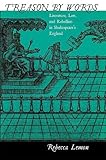Treason by Words : Literature, Law, and Rebellion in Shakespeare's England / Rebecca Lemon.
Material type: TextPublisher: Ithaca, NY : Cornell University Press, [2011]Copyright date: ©2011Description: 1 online resource (256 p.) : 7 halftones, 1 chart/graphContent type:
TextPublisher: Ithaca, NY : Cornell University Press, [2011]Copyright date: ©2011Description: 1 online resource (256 p.) : 7 halftones, 1 chart/graphContent type: - 9780801462269
- English drama -- History and criticism -- 17th century
- English drama -- History and criticism -- Early modern and Elizabethan, 1500-1600
- English drama -- History and criticism -- 17th century
- Literature and state -- Great Britain -- History -- 16th century
- Treason in literature
- Legal History & Studies
- Literary Studies
- Medieval & Renaissance Studies
- LITERARY CRITICISM / Shakespeare
- 822.309358
- PR658.T77
- online - DeGruyter
| Item type | Current library | Call number | URL | Status | Notes | Barcode | |
|---|---|---|---|---|---|---|---|
 eBook
eBook
|
Biblioteca "Angelicum" Pont. Univ. S.Tommaso d'Aquino Nuvola online | online - DeGruyter (Browse shelf(Opens below)) | Online access | Not for loan (Accesso limitato) | Accesso per gli utenti autorizzati / Access for authorized users | (dgr)9780801462269 |
Frontmatter -- Contents -- Acknowledgments -- CHAPTER ONE. Sovereignty, Treason Law, and the Political Imagination in Early Modern England -- CHAPTER TWO. The Treason of Hayward's Henry IV -- CHAPTER THREE. Shakespeare's Anatomy of Resistance in Richard II -- CHAPTER FOUR. Scaffolds of Treason in Shakespeare's Macbeth -- CHAPTER FIVE. Donne's Pseudo-Martyr and Post-Gunpowder Plot Law -- CHAPTER SIX. Treason and Emergency Power in Jonson's Catiline -- Afterword -- Notes -- Works Cited -- Index
restricted access online access with authorization star
http://purl.org/coar/access_right/c_16ec
Under the Tudor monarchy, English law expanded to include the category of "treason by words." Rebecca Lemon investigates this remarkable phrase both as a legal charge and as a cultural event. English citizens, she shows, expressed competing notions of treason in opposition to the growing absolutism of the monarchy. Lemon explores the complex participation of texts by John Donne, Ben Jonson, and William Shakespeare in the legal and political controversies marking the Earl of Essex's 1601 rebellion and the 1605 Gunpowder Plot. Lemon suggests that the articulation of diverse ideas about treason within literary and polemical texts produced increasingly fractured conceptions of the crime of treason itself. Further, literary texts, in representing issues familiar from political polemic, helped to foster more free, less ideologically rigid, responses to the crisis of treason. As a result, such works of imagination bolstered an emerging discourse on subjects' rights. Treason by Words offers an original theory of the role of dissent and rebellion during a period of burgeoning sovereign power.
Mode of access: Internet via World Wide Web.
In English.
Description based on online resource; title from PDF title page (publisher's Web site, viewed 26. Apr 2024)


